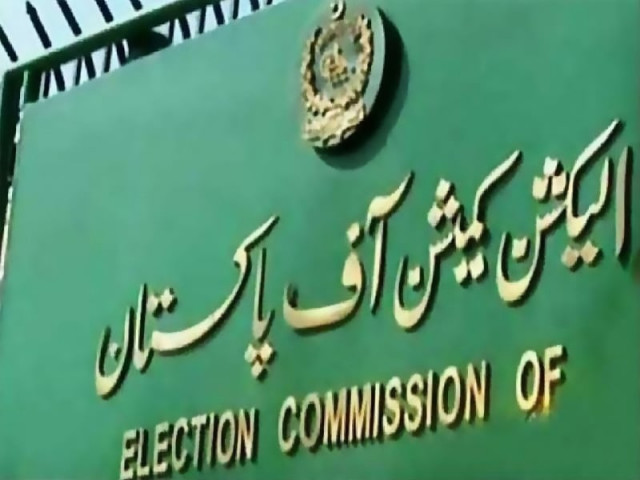What options does ECP has in seats matter
Commission faces pressure from both parliament and the judiciary

The clock has been ticking for weeks, yet the Election Commission of Pakistan (ECP) has remained silent on a decision that could reshape the balance of power in the National Assembly and lead to broader changes on the political chessboard in the country.
The ECP found itself at the centre of a mounting political-cum-judicial standoff between the Parliament and Supreme Court, as it faces pressure from both sides to resolve the allocation of reserved seats at the earliest.
Not only that, the ECP faces pressure from both Parliament and the judiciary as each institution is pushing for resolutions that reflect their interpretations of the law. After a firm Supreme Court ruling on the allocation of reserved seats and back-to-back letters to the national poll body by National Assembly Speaker Sardar Ayaz Sadiq, all eyes were on the ECP to give a decision which should settle the issue that has left both sides of the aisle in a tense holding pattern.
But as weeks turn into months, the delay is fueling questions: Is the ECP caught in a political-cum-judicial crossfire, or is it carefully weighing its options amidst mounting pressure from Parliament and the top court. Political observers wonder how long the ECP will take to decide the issue.
"The Election commission is proving that it's no longer an independent institution, rather acting as intended by the government," Professor Tahir Naeem Malik of the NUML University said while commenting on the inordinate delay by ECP on the matter.
While referring to the passing of the 26th Constitutional Amendment and, among other things, a bill increasing age the limit of the army chief's service from three-to-five year, the professor said that such "key legislation is being done by an incomplete Parliament", saying it's a question of political morality as well for the parties claiming that the seats belonged to them.
"It [ECP] isn't in the mood to do anything right now as ECP feels that it has support from the government and powerful quarters," Professor Malik said. "Till now, the commission has preferred to adopt the government's version regarding the reserved seats at the cost of its reputation."
It all had started after the Supreme Court short order in the reserved seats' matter followed by the detailed judgment, which not only listed down the national poll body's failures, but further squeezed room to defy its order.
The detailed judgment on the July 12 short order, which had declared the PTI a parliamentary party and entitled it to have reserved seats in the national and provincial assemblies, had come on the heels of a note released by the eight-member bench directing ECP to implement the judgment at the earliest.
However, in between the short and detailed orders, two major developments took place: the Parliament swung into action and amended the Elections (Second Amendment) Act, 2024, which imposed new restrictions on party-switching by independent candidates; and speaker National Assembly wrote a letter to ECP urging it to respect parliamentary sovereignty in the allocation of reserved seats to PTI.
Thus, as irony would have it, the ECP became a sandwich between Parliament and Supreme Court in their ongoing face-off. On one hand, the SC majority ruling declared that ex-premier Imran Khan's PTI is eligible for seats reserved for women and minorities as ECP failed to fulfill its role in the general elections of 2024 while, on the other hand, the speaker has emphasised that the recent amendments to the elections act must be applied when the ECP allocates these contested seats.
Notably, the SC detailed judgment has two major political impacts: if ECP implements it then PTI would emerge as the single largest party in the National Assembly; and, once that happened, the ruling parties would lose the much-desired two-third majority in the NA.
Since ECP hasn't yet implemented the SC judgment, the matter has once again triggered a debate about the political implications and what options are available to ECP amid a stand-off between the Parliament and SC.
In a recent write up on the reserved seats' situation, Pakistan Institute of Legislative Development and Transparency (PILDAT) President Ahmed Bilal Mehboob revealed that only 77 out of a total 226 seats for women and non-Muslims in NA and three provincial assemblies are at stake as the remaining 149 have already been distributed among various political parties in proportion to their general seats in the respective assemblies.
The piece before suggesting a way forward stated that the July 12 Supreme Court order, as well as the election amendment passed by the parliament is intact, stating that they both are in field unless amended by the relevant institution.
Keeping both sides' views in view, he felt that the issue appears to still be open to interpretation, especially, after an overhaul of Supreme Court – where the selection process for CJP has changed and constitutional matters will only be heard by the constitutional benches.
"While much water has flowed under the bridge," he stated in his piece published on November 2, "the honourable Supreme Court and its soon-to-be-formed constitutional bench will have to find a way to resolve the issue, as the order of the Supreme Court and the law passed by parliament competes for superiority."



















COMMENTS
Comments are moderated and generally will be posted if they are on-topic and not abusive.
For more information, please see our Comments FAQ